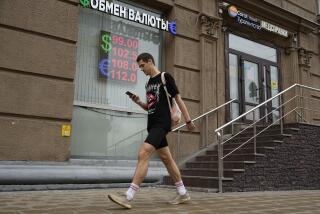BALKANS : Some See Voodoo Economics After Belgrade Bounces Back
BELGRADE, Yugoslavia — For the last 4 1/2 months, Yugoslavia’s 10 million citizens have been enjoying a respite from the rigors of 2-year-old U.N. sanctions, including an oil embargo.
Today, more cars are cruising the streets of this capital than at any time since the sanctions were imposed to punish the Belgrade government for its role in the violent partition of neighboring Bosnia-Herzegovina.
Hyper-inflation, once raging at an annual rate estimated at 300,000,000%, has all but disappeared.
“At least I no longer have to race around like a maniac trying to spend my salary before it evaporates,” said Bojana Popovic, a saleswoman at a Belgrade bookstore. “It is a psychological boost. I no longer spend all my time trying to think up ways to find and buy basic essentials.”
With her monthly salary equal to about $50, roughly the national average, Popovic once had to act fast to spend any dinars left in her wallet because they lost value by the hour.
“Now . . . I know that my dinar will be worth the same tomorrow,” she said.
The credit, Popovic and others say, goes to an emergency fiscal program introduced Jan. 25 by Central Bank Director Dragoslav Avramovic that pegged a new dinar to the deutsche mark at a one-for-one level.
Avramovic, who once worked for the World Bank in Washington, boasts that the country’s foreign exchange reserves, which stood at $195 million in January, have risen by half.
“We have actually overcome the blockade. Yugoslavia can no longer be blackmailed with sanctions; the blockade and sanctions are now secondary problems,” he crowed.
Indeed, Yugoslavia’s Serbian leadership has never been so self-confident since sanctions went into force, say Western diplomats based here. The economic situation has improved to such an extent that diplomats worry that Serbian leaders will be less likely to meet international demands and make concessions to their Bosnian Muslim foes.
Meanwhile, Avramovic is hailed as his country’s savior, credited for bringing food back to the grocery shelves and filling up barren department stores with clothes and other consumer goods.
Others, however, say the availability of consumer goods owes more to a vast network of criminals and smugglers than fiscal management. And gloomy Belgrade economists and businessmen say the good times are a temporary phenomenon, fed in part by public confidence in the new dinar.
The economy of Yugoslavia, which now is made up of just Serbia and Montenegro, has been devastated not only by the sanctions but the cost of waging nearly three years of war, economists say. The annual budget deficit of $1.5 billion represents an awesome obstacle to true recovery, and continuing support for the forces of Serbian rebels in Bosnia remains a great burden.
Skeptics suggest that while Avramovic has succeeded in stopping the printing presses at the national mint, credits are being issued instead.
Milutin Mitrovic, editor of Ekonomska Politika, an independent economic magazine, points to hidden inflation, saying, “Businessmen have taken out credits but are unlikely to pay them back, which will mean a return of inflation.”
“It is a game of smoke and mirrors. The stores are stocked, but with last year’s products,” said a Belgrade businessman speaking on condition of anonymity.
While Serbian officials point to growth in industrial production over the last four months as evidence of long-term success, economists say that improvement is still far below the pre-sanctions level. The rise was 3% in April, according to official statistics, a disappointment after March’s 24% rise.
“This is no miracle,” said Ivan Vujacic, an economist at Belgrade University. “After hyper-inflation is stopped, it is always followed by a jump in production.”
Economists predict that by September, the program will cave in, unable to meet all the demands.
“For me, it’s just a question of whether it will collapse in June or September. Quite simply, there is no way that they can pay for this year’s wheat harvest,” the businessman said.
More to Read
Sign up for Essential California
The most important California stories and recommendations in your inbox every morning.
You may occasionally receive promotional content from the Los Angeles Times.










